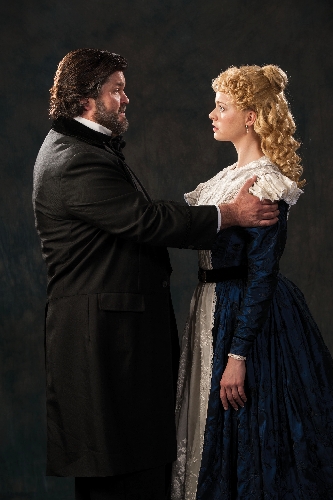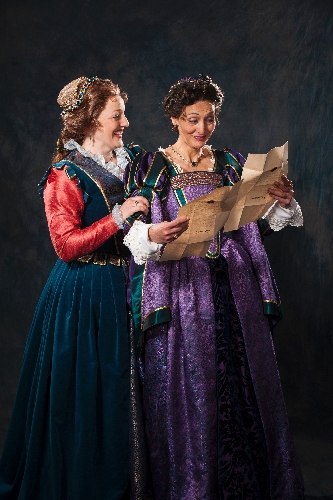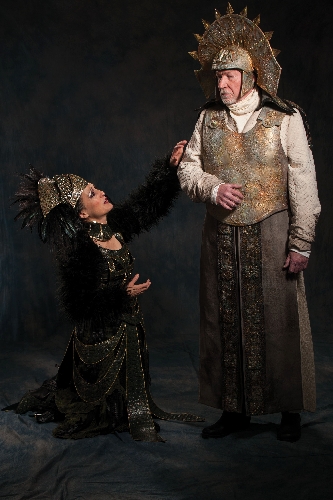Utah Shakespeare Festival opening six shows, including ‘Les Miserables’



Theirs may be madness, but there’s method in it.
Hamlet may have said it, but the Utah Shakespeare Festival lives it.
The madness has already begun, with previews now under way for the festival’s 51st annual season in Cedar City, which officially opens Thursday.
"We’re going to open all six shows in three days," says L. Scott Phillips, the festival’s executive director. "We’re the only company in the country that opens six shows in three days."
When asked why, Phillips has a straightforward reply: "We’re crazy, number one."
He’s joking, but only partly.
Opening six shows in three days will make it easier on visiting critics to review the festival’s summer lineup in a timely fashion, Phillips points out – a crucial consideration in this age of instant information (and shrinking budgets).
Before the plays hit the stage in final form, "we’re going to kill a few people," he says – again, only half in jest. "We made the madness even worse, but there’s a method to it."
Of USF’s six summer productions, two are from William Shakespeare’s pen: the comic romp "The Merry Wives of Windsor" and the rarely performed "Titus Andronicus," which kick off the festival’s "Complete the Canon" initiative – a commitment to produce all 38 of Shakespeare’s plays over the next dozen years.
Joining both Shakespeare productions in the festival’s outdoor Adams Shakespearean Theatre : a new version of Friedrich Schiller’s "Mary Stuart." David Ivers, one of the festival’s artistic directors, says, "there couldn’t be a more quintessentially Elizabethan play," especially considering its focus on Queen Elizabeth I’s power struggle with her cousin Mary Stuart. (Better known as Mary, Queen of Scots.)
The festival’s indoor Randall L. Jones Theatre, meanwhile, hosts the season’s top box-office attractions: the musical powerhouse "Les Miserables" and a stage adaptation of Harper Lee’s beloved novel "To Kill a Mockingbird." The farcical "Scapin," an updated version of Moliere’s "Scapino," rounds out the Randall L. Jones productions.
Also on the festival schedule: three free outdoor Greenshows, featuring Elizabethan-style music and dance; August’s New American Playwrights Project, with presentations of three new works; plus production and literary seminars, backstage tours, even a look at the "Repertory Magic" behind the twice-a-day transformation between matinee and evening performances at the Randall L. Jones Theatre.
Initially, "Les Miserables" – this summer’s hottest ticket – wasn’t even part of the USF lineup, artistic director Brian Vaughn says.
"We originally had ‘The Drowsy Chaperone,’ " a "light and frothy" 1920s-style musical, on the summer schedule, Vaughn recalls.
After repeatedly requesting official permission to produce "Les Mis" (the festival audience’s most-requested show, according to Phillips), USF finally got the go-ahead to stage the musical adaptation of Victor Hugo’s classic novel, which centers on embattled ex-convict Jean Valjean’s search for redemption in 19th-century France.
The cost of staging "Les Mis" pushed the festival’s 2012 budget to $7.4 million, Phillips notes, which is "the biggest it’s ever been."
But festival officials are gambling that "Les Mis" will sell enough tickets during its extended run – which continues through Oct. 19 – to offset the increased expenses.
Vaughn attributes the continuing appeal of "Les Mis," partly to the familiarity of its stirring musical score.
"You can’t get in an elevator without hearing ‘I Dreamed a Dream,’ " points out Vaughn, who’s playing the show’s resident villain, the relentless Inspector Javert. ("I’m not necessarily the bad guy," he maintains, "I’m just the misunderstood guy.")
But Vaughn also cites the show’s "amazing message – that to love another person is to see the face of God." In addition, there’s "the element of redeeming oneself and choosing a different path" he comments, "and that, even in the darkest hour, there is light."
But audiences expecting an elaborate, Broadway-style spectacle should readjust their expectations, Vaughn cautions – especially in the intimate Randall L. Jones Theatre.
"That’s sort of our mission at the festival," he says. "We are not going to compete with the big, blockbuster Broadway shows. We’re a language-based theater," and the USF production is "going to elevate" the material, Vaughn contends. "It’s less about the spectacle and more about the story."
Speaking of story, "To Kill a Mockingbird" also illustrates "the power of literature," Phillips says, noting that Harper Lee’s coming-of-age classic – set in small-town, segregation-era Mississippi – ranks with Shakespeare and the Bible as "the most widely read" texts in the English language.
A longtime festival favorite returns to portray "Mockingbird’s" father figure, principled lawyer Atticus Finch: Martin Kildare, whose previous USF roles have ranged from "Hamlet’s" title role to "Othello’s" Iago.
Kildare’s hardly the only festival veteran returning to Cedar City this season after an extended absence, however.
There’s Monica Bell, alias "Mary Stuart’s" Queen Elizabeth, who was an ’80s standout in such roles as Lady Macbeth and "Othello’s" Desdemona.
And, playing "Scapin’s" mischievous title servant: Ivers, a 20-year festival regular, who describes the farce as a "very, very contemporary kind of tongue-in-cheek adaptation" that’s "highly colloquial and takes huge leaps anachronistically."
More than Moliere, "it takes its cues from vaudeville," Ivers says. And as much as he enjoys the knockabout comedy, "it takes a certain toll at my age," he admits. "My knees are killing me."
Both "Scapin" and Shakespeare’s "Merry Wives" provide the welcome comedy relief in a season that tilts toward the dark side of human nature, given the sobering themes of "Les Mis," "Mockingbird" and "Mary Stuart."
Not to mention "Titus Andronicus," one of Shakespeare’s earliest – and bloodiest – plays.
"I like to think of it as Shakespeare’s summer blockbuster play," says Vaughn, describing it as "no holds barred" in its depiction of the brutal, ultimately futile, power struggle between "Titus’ " title character and Goth Queen Tamora. (No wonder it was one of Shakespeare’s most popular works during his lifetime.)
But "Titus" also addresses themes – among them "revenge, tragedy and honor" – that Shakespeare explored in subsequent works, Vaughn adds.
That’s one of the reasons for the "Complete the Canon" initiative, Vaughn and Ivers point out.
"People have no idea if they like ‘Titus Andronicus’ or not," Ivers points out, "because we haven’t produced it" since 1990.
And a play like "Cymbeline" (which the festival last staged in 1988 and 2002) "may resonate with a generation of theatergoers" differently now than in past years, Ivers adds. "That’s important to us."
After all, "Shakespeare’s our touchstone, Vaughn explains. "We want to re-energize that work."
And energy, Ivers says, is what sets the Utah Shakespeare Festival apart.
"It sort of defies some sort of reasoning," he says of the festival’s lasting appeal, "but that’s the thing that makes it so special – the energy of the place."
Contact reporter Carol Cling at ccling@reviewjournal.com or 702-383-0272.
Preview51st annual Utah Shakespeare Festival
Through Sept. 1
"Mary Stuart"
"The Merry Wives of Windsor"
"Scapin"
"Titus Andronicus"
"To Kill a Mockingbird"
Through Oct. 19
"Les Miserables"
Southern Utah University, Cedar City (2½ hours northeast of Las Vegas on Interstate 15)
$22-$73 (800-752-9849, bard.org)












